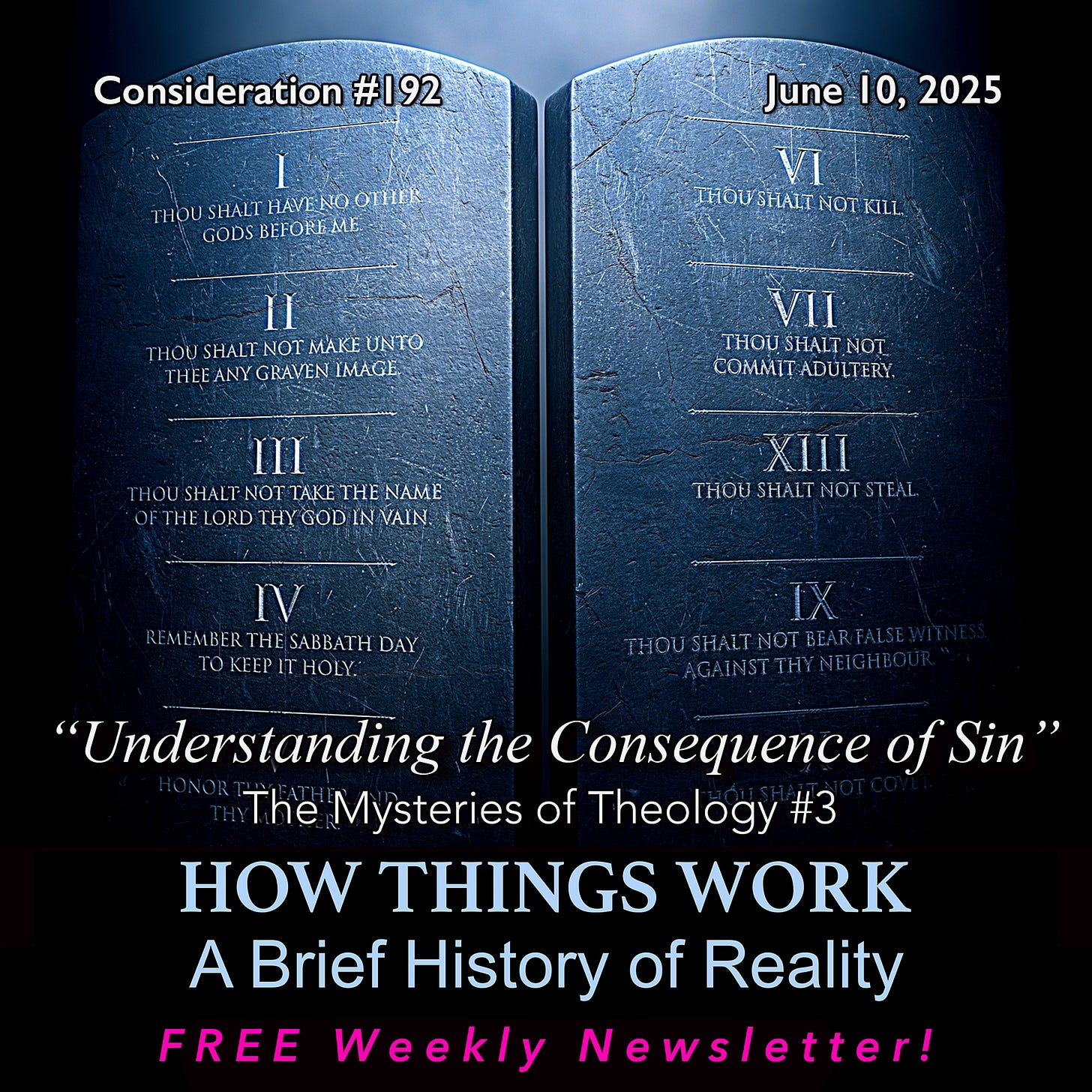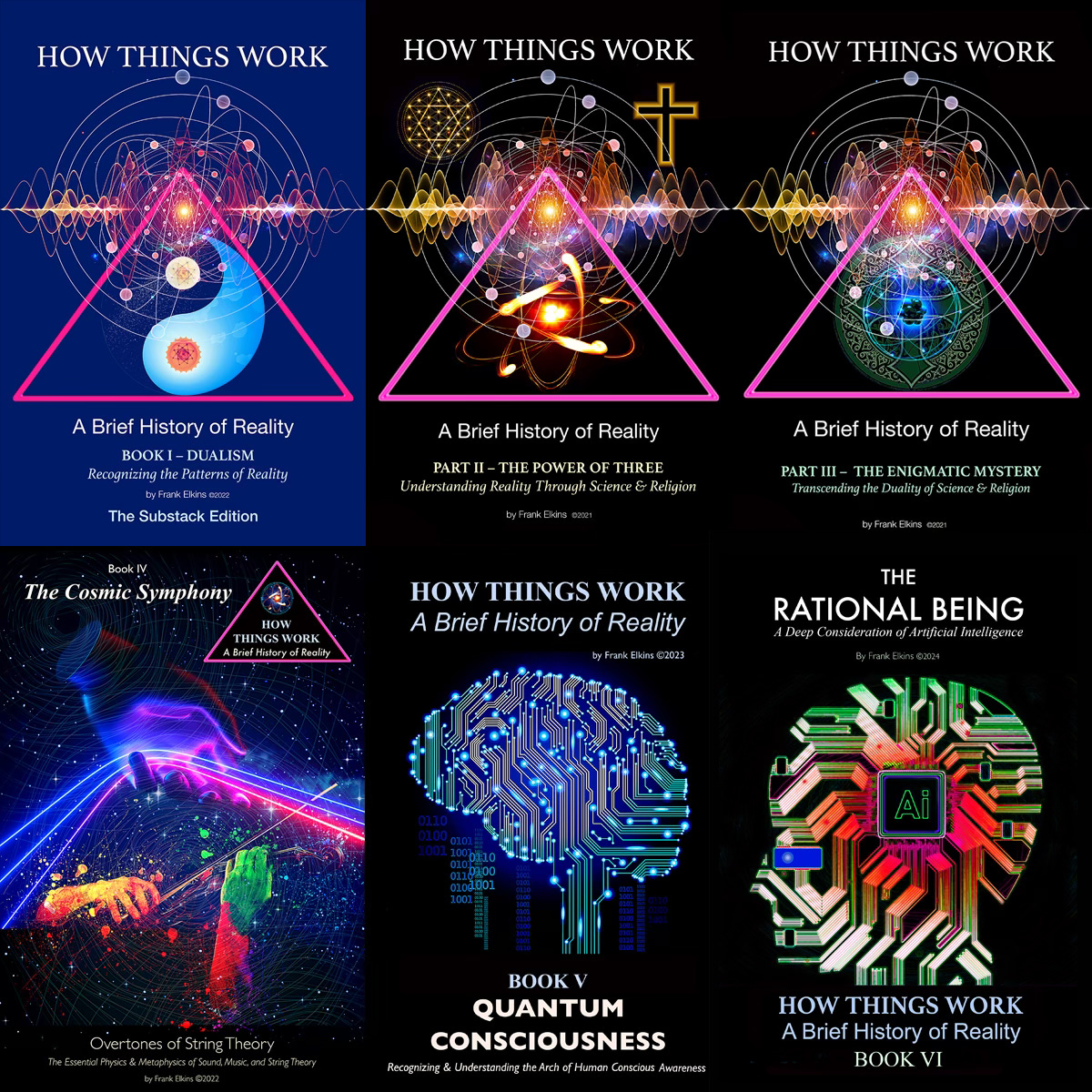Understanding the Consequence of Sin
BOOK III: The Enigmatic Mystery – Consideration #192
Be a part of the Conversation!
Tuesday June 10, 2025
“The Lord said to Moses, ‘Come up to me on the mountain and stay here, and I will give you the tablets of stone with the law and commandments I have written for their instruction...’ And he stayed on the mountain forty days and forty nights.”
– Exodus 24:12,18
PREFACE
Welcome Everybody!
In Act One of the Biblical narrative, the disobedience of mankind plunges God’s new world into the chaos of duality. The separation between God and Mankind leads to unlimited wickedness and violence that causes God to consider eliminating human beings from the earth. However, Noah’s righteousness causes God to spare Mankind and begin a process of redemption and atonement. Act One concludes with the first Biblical turning point; God’s covenant with Abraham. In Act Two God empirically manifests this covenant through Mosses and The Law.
“Moses represents the second turning point in the Biblical narrative.”
God’s process for redemption transitions from recognizing sin to transcending that recognition into understanding the consequences of sin by specifying and codifying Righteous human behavior. God specifically makes His will and intentions known to “His people” by giving them “His Laws.” Moses represents the second turning point in the Biblical narrative. Now that the chosen people have established themselves as believers in the “One” God under Abraham who are seeking Righteousness, God will show them how separated from Righteousness they really are by instituting The Law as a mirror in which to see themselves more clearly.
“Moses becomes the vehicle for this transformation as well as the transition into the final act…”
By defining the boundaries between acceptable and unacceptable human behavior, Mankind would more clearly see their inability to manage life while being separated from God. In Act One the chosen people of God learn to recognize sin, or separation from God, as the source of wickedness and suffering. In Act Two, the “children of Abraham” come to a deeper understanding of this separation through their direct accountability under the Law. Moses becomes the vehicle for this transformation as well as the transition into the final act of the Biblical narrative. Moses, like all human beings separated from God, serves as a foil to God; much like human beings themselves had become a foil to God.
“God is conditioning His people for entrance into the ‘promised land.’”
God “trains” Moses on what to do and what to say, who then trains the people in God’s ways. The Israelites become responsible for understanding and practicing God’s will and intention through Moses and The Law; in addition to understanding the empirical consequences of not following it consistently. God is conditioning His people for entrance into the “promised land.” And like strong steel, He tempers them by continually striking them in the fire of trials and tribulations. After centuries of slavery in Egypt, God would burden them with an additional forty years in the desert wasteland; purging an entire generation of people who had fled Egypt whom God had denied from entering the Promised Land because of their sin and wickedness.
CONSIDERATION #192 – Understanding the Consequence of Sin (Act Two)
As the hero of the Old Testament, Moses prepares God’s chosen people for the responsibility of being God’s chosen people, giving them God’s Law as a template for Righteousness, and delivering them to the land God had promised Abraham over four generations prior. However, in the world of duality, even God’s Law can be used to separate people and provide an opportunity to move further away from God and atonement. The Israelites were easily distracted and deterred from following the letter and spirit of the Law; consistently falling into the sin of duality.
“Following the Law was not an easy thing to do…”
The history of Judaism is a history of attempted Righteousness. Following the Law of Moses became the hallmark of that Righteousness. As Judaism became a dominant force in the world, its leaders came to possess great power, authority, and influence. They prided themselves on being experts in The Law, while often using it for their own exoneration. Following the Law was not an easy thing to do; in fact, it was impossible to do if you were separated from God. A state of constant atonement would be necessary for success. However, righteous prophets were sent by God periodically to help keep His people and their leaders in line and on track.
“The Law represents a kind of understanding through limitation…”
The Law demonstrated and mirrored the impossibility of gaining atonement by trying to follow the Law; everyone falling short. The Law represents a kind of understanding through limitation, setting limits in our actions to help us see the limits in our awareness of Oneness with God. Constantly struggling to follow the letter of the law clearly shows us how far from God’s will we have fallen. It helps us to understand the nature of sin, and that the manifestation of sin originates from us.
The Law corrals us into action and behavior that enable us to better understand the nature of our choices by helping us to see the consequences resulting from making them. Good choices result in a better life, for everyone. Evil choices result in a miserable life, for everyone. The better our choices, the better our lives. This is the beginning of wisdom, and civilization. However, nobody makes good choices all of the time. We all fall short of the Law. The only thing more difficult than following the Law of Moses is following the will of God, which is inherently one and the same. A theological mystery only experienced through complete atonement.
“The Holy Trinity reflects a new Christian mystery of atonement…”
Mosses and the Law become the empirical foundation for what we know today as Judaism and becomes the second turning point in the continuing Christian narrative leading to the final act of the Bible. In Act Three, or what we know today as the New Testament, the Law of Mosses is fulfilled; thereby transcending the Law of Moses into the Kingdom of Heaven through a reunification of God and Mankind. The Holy Trinity reflects a new Christian mystery of atonement demonstrated through Jesus as “the Messiah,” or “Christ,” and the final resolution to the Biblical narrative.
POSTSCRIPT
The New Testament reflects the third act in the Biblical narrative which brings a “resolution” to the original “setup” and “confrontation” presented in the first two acts. The first two acts represent the Jewish roots of Christianity, whereas the final act represents the Christian solution to this ancient Jewish dilemma called atonement. Their solution is a man called Jesus of Nazareth who they acknowledge as the long prophesied Jewish Messiah who would be sent by God to restore Righteousness on the earth.
A small sect of Jewish Christians would transform this belief into the largest religion on earth: Christianity. Christian theology considers a new set of spiritual mysteries including the Logos, the Holy Trinity, and the Kingdom of Heaven.
Next week we will consider the scientific mystery of matter and antimatter…
Get More Reality with the “Reality by a Thread” Paid Upgrade!
Click Image to Learn More…
Unique Content Makes Untangling the Knots of Reality “One of the Best Podcasts about History!”
Excerpt from this week’s Podcast: “Untangling the Final Days of Jesus”
“…this unique Substack podcast by FRANK ELKINS is not strictly speaking history. It is a strange mix of history, philosophy, theology, spirituality, physics, and astronomy…Try this podcast for a start.”
– Barbora Jirincova, The Best Podcasts About History
Excerpt from this week’s “Reality by a Thread” (Why Do Human Beings Choose Conflicting Identities?)
“The essential reason that human beings manifest conflicting identities is because empirical identities are basically hardwired into our being, whereas rational identities are willed into existence through individual and group choice. Most rational identities are inherently designed to help reduce the influence of particular empirical identities; specifically, by reducing the power and control of the empirical self. Therefore, empirical and rational identities are inherently and necessarily in conflict with each other from the start.”
– Frank Elkins (Reality by a Thread: June 12, 2025)
All for less than a couple of cafe lattes every month at a local coffee shop! And You Will Have Something Interesting to Talk About With Your Friends at the Coffee Shop!!
Only $7.00 a month or $70.00 a year! UPGRADE NOW!
Book VI – The Rational Being
“We are not ‘creating’ Artificial Intelligence; we are ‘discovering’ Artificial Intelligence. Science does not create things; it is a discipline of discovery. This is a critical distinction. It essentially means that AI is, and always has been, inevitable. The real question is are we in competition with it in terms of survival?” (Click to Watch…)




